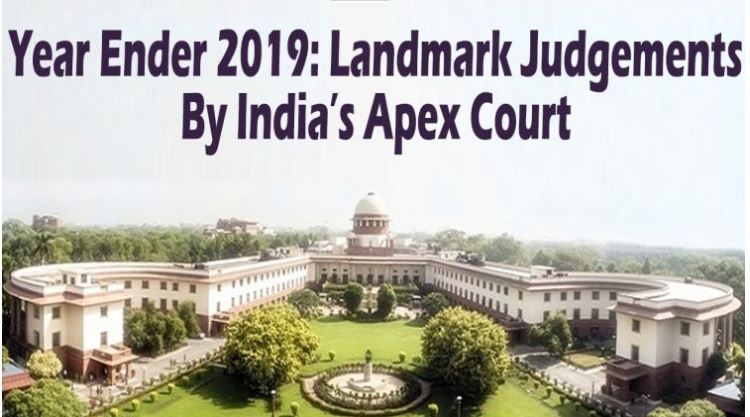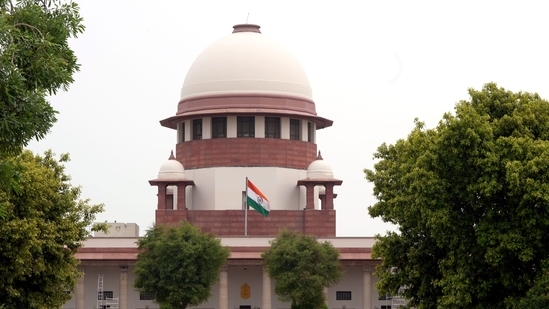The Supreme Court, being the highest court of the country, remains busy all-round the year entertaining a variety of important cases. In the year 2019, the landmark verdict of the Supreme Court of India came into view. Many of these decisions reached the end of the reign of Ranjan Gogoi, the former Chief Justice of India.
Let’s look at the historic decisions that were made this year.
Ayodhya land dispute:
Bringing to a close the longest-drawn controversy in the country's history that had become one of the most defining aspects of its polity, the Supreme Court on November 9, granted the ownership of the 2.77 acres of disputed land in Ayodhya to the Hindus, paving the way for the construction of a Ram Temple, and ruled that the Muslims will get 5 acres of land at an alternative site. A five-judge bench led by Chief Justice Ranjan Gogoi unanimously decided that the disputed land must be given to Hindus and ordered the Central government to form a trust for the construction of a temple.
Sabarimala Temple review:
The Supreme Court transferred the review petitions against entry of women in Sabarimala temple to a larger 7-judge bench today in a 3:2 verdict. The court did not put a stay on the September 28, 2018 judgment which lifted the ban on the entry of women aged between 10 and 50 in the temple. According to this order, women of all ages can visit the shrine till a larger bench decides this issue. The constitution bench comprising Chief Justice of India Ranjan Gogoi and Justices Rohinton Fali Nariman, A M Khanwilkar, D Y Chandrachud and Indu Malhotra, heard the review pleas on November 14.
End of Rafale case:
The Supreme Court on November 14 rejected petitions seeking an inquiry into the Rafale fighter jet deal. The top court said it found no merit in the pleas for review of its earlier ruling in which it had given a clean chit to the government and ruled out any "roving" inquiry into the deal for procuring 36 fighter planes from French company Dassault. The court had on May 10 reserved its order on the petitions filed by lawyer Prashant Bhushan and former Union ministers Yashwant Singh and Arun Shourie, seeking a review of its ruling of December last year that there was no occasion to doubt the decision-making process involved in the Rafale deal.
Contempt Case Against Rahul Gandhi:
The apex court closed a criminal contempt plea against Congress leader Rahul Gandhu filed by BJP MP Meenakshi Lekhi for wrongly attributing to the apex court his "chowkidar chor hai" remark against Prime Minister Narendra Modi in the Rafale deal case. The court said “Mr Rahul Gandhi needs to be more careful in future”. "It is unfortunate that without any verification certain remarks were made by the contemnor (Rahul Gandhi) against the prime minister," a bench comprising Chief Justice Ranjan Gogoi and Justices S K Kaul and K M Joseph said.
CJI Office Under RTI:
In another landmark verdict, the Supreme Court on November 13, held that the office of Chief Justice of India is public authority under the purview of the transparency law, Right to Information Act (RTI). A five-judge constitution bench headed by Chief Justice Ranjan Gogoi pronounced the judgement a short while ago and upheld the Delhi High Court verdict of 2010. Other members of the bench are Justices N V Ramana, D Y Chandrachud, Deepak Gupta and Sanjiv Khanna.
The Supreme Court, being the highest court of the country, remains busy all-round the year entertaining a variety of important cases. In the year 2019, the landmark verdict of the Supreme Court of India came into view. Many of these decisions reached the end of the reign of Ranjan Gogoi, the former Chief Justice of India.
Let’s look at the historic decisions that were made this year.
Ayodhya land dispute:
Bringing to a close the longest-drawn controversy in the country's history that had become one of the most defining aspects of its polity, the Supreme Court on November 9, granted the ownership of the 2.77 acres of disputed land in Ayodhya to the Hindus, paving the way for the construction of a Ram Temple, and ruled that the Muslims will get 5 acres of land at an alternative site. A five-judge bench led by Chief Justice Ranjan Gogoi unanimously decided that the disputed land must be given to Hindus and ordered the Central government to form a trust for the construction of a temple.
Sabarimala Temple review:
The Supreme Court transferred the review petitions against entry of women in Sabarimala temple to a larger 7-judge bench today in a 3:2 verdict. The court did not put a stay on the September 28, 2018 judgment which lifted the ban on the entry of women aged between 10 and 50 in the temple. According to this order, women of all ages can visit the shrine till a larger bench decides this issue. The constitution bench comprising Chief Justice of India Ranjan Gogoi and Justices Rohinton Fali Nariman, A M Khanwilkar, D Y Chandrachud and Indu Malhotra, heard the review pleas on November 14.
End of Rafale case:
The Supreme Court on November 14 rejected petitions seeking an inquiry into the Rafale fighter jet deal. The top court said it found no merit in the pleas for review of its earlier ruling in which it had given a clean chit to the government and ruled out any "roving" inquiry into the deal for procuring 36 fighter planes from French company Dassault. The court had on May 10 reserved its order on the petitions filed by lawyer Prashant Bhushan and former Union ministers Yashwant Singh and Arun Shourie, seeking a review of its ruling of December last year that there was no occasion to doubt the decision-making process involved in the Rafale deal.
Contempt Case Against Rahul Gandhi:
The apex court closed a criminal contempt plea against Congress leader Rahul Gandhu filed by BJP MP Meenakshi Lekhi for wrongly attributing to the apex court his "chowkidar chor hai" remark against Prime Minister Narendra Modi in the Rafale deal case. The court said “Mr Rahul Gandhi needs to be more careful in future”. "It is unfortunate that without any verification certain remarks were made by the contemnor (Rahul Gandhi) against the prime minister," a bench comprising Chief Justice Ranjan Gogoi and Justices S K Kaul and K M Joseph said.
CJI Office Under RTI:
In another landmark verdict, the Supreme Court on November 13, held that the office of Chief Justice of India is public authority under the purview of the transparency law, Right to Information Act (RTI). A five-judge constitution bench headed by Chief Justice Ranjan Gogoi pronounced the judgement a short while ago and upheld the Delhi High Court verdict of 2010. Other members of the bench are Justices N V Ramana, D Y Chandrachud, Deepak Gupta and Sanjiv Khanna.










12.jpeg)
151.jpeg)
152.jpeg)
5.jpeg)

5.jpeg)
8.jpeg)
9.jpeg)
17.jpeg)





